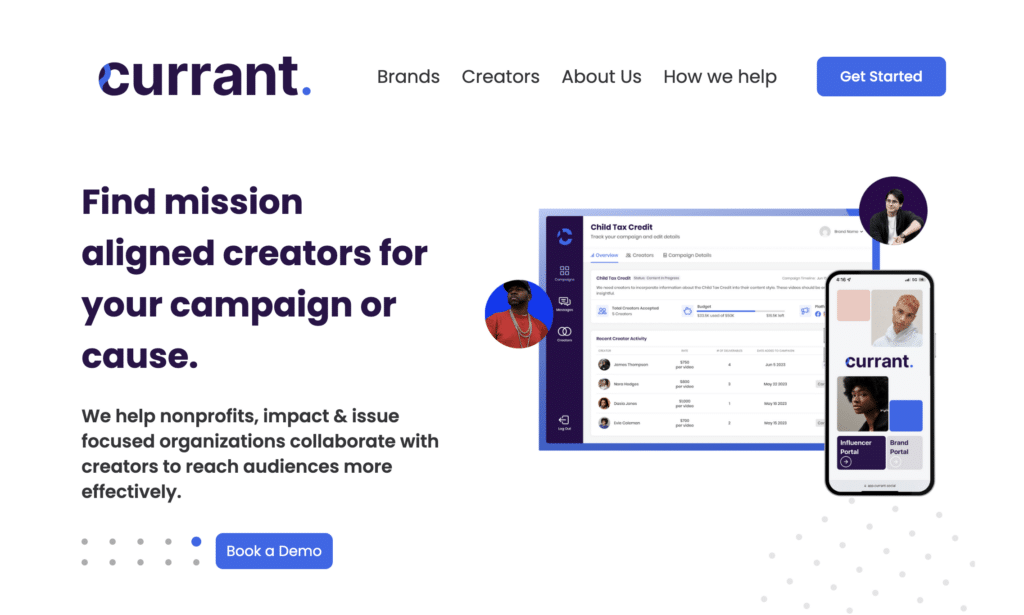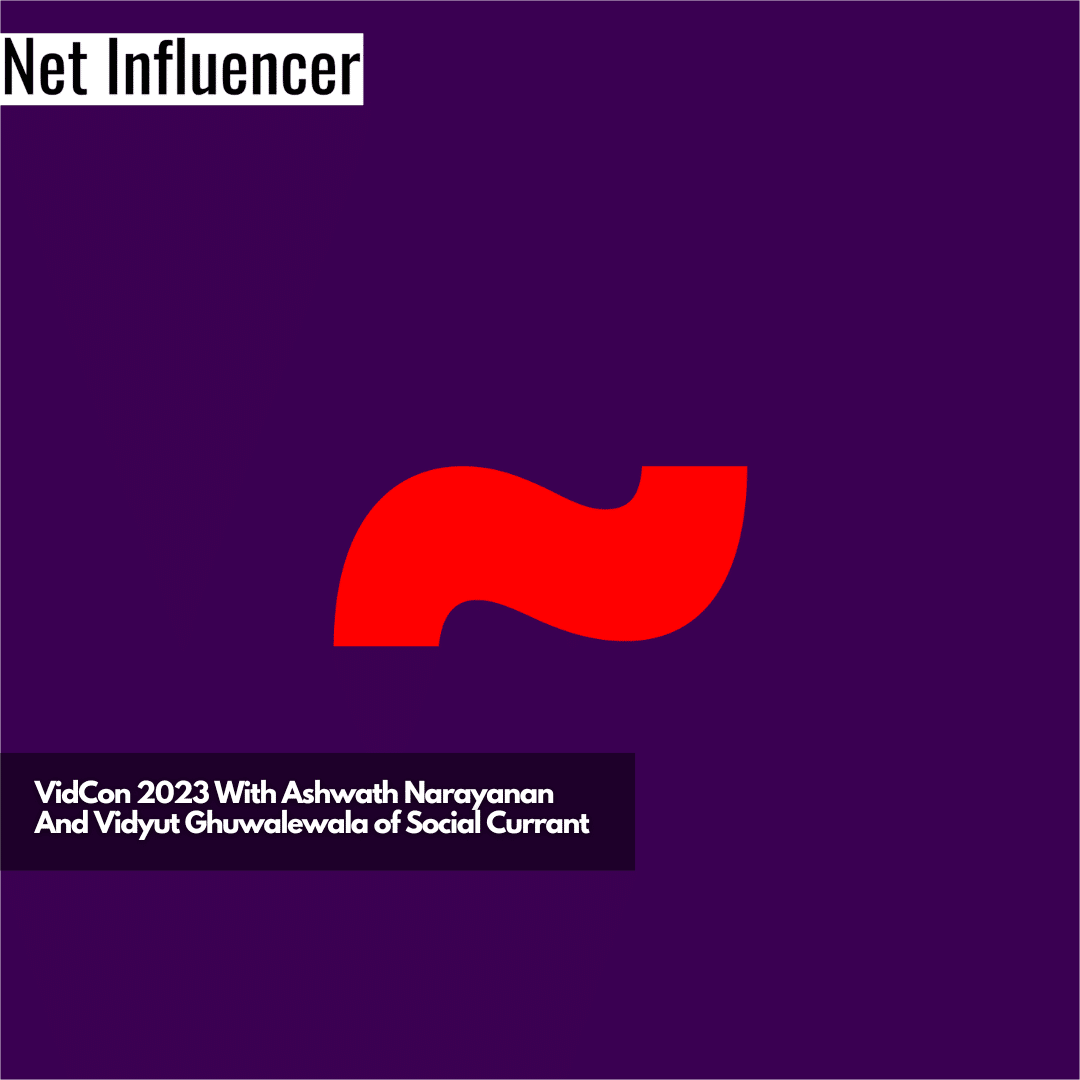Agency
VidCon 2023 With Social Currant’s Founders: Ashwath Narayanan & Vidyut Ghuwalewala
In an insightful conversation with Ashwath Narayanan and Vidyut Ghuwalewala, they discuss the evolving landscape of the creator economy and their predictions following VidCon 2023. They emphasize the importance of socially conscious collaborations between creators and brands, predicting a future focus on mission-based initiatives that resonate authentically with audiences. They also highlight the transformative potential of AI in content creation, emphasizing the importance of adaptability and personal brand-building for creators in this rapidly growing industry.
In an insightful conversation with Ashwath Narayanan and Vidyut Ghuwalewala, they discuss the evolving landscape of the creator economy and their predictions following VidCon 2023. They emphasize the importance of socially conscious collaborations between creators and brands, predicting a future focus on mission-based initiatives that resonate authentically with audiences. They also highlight the transformative potential of AI in content creation, emphasizing the importance of adaptability and personal brand-building for creators in this rapidly growing industry.
More about Vidyut Ghuwalewala and Ashwath Narayanan
Vidyut Ghuwalewala and Ashwath Narayanan co-founded Social Currant. The company is the brainchild of Ashwath Narayanan and started as a social media firm. They cater to many foreign nonprofit clients and offer many services, including graphic design, web development, marketing campaigns, and many others.


In the summer of 2021, they had the opportunity to run an influencer campaign for one of their clients. The first five videos they did for this client got more than a million views, and they realized there was a market and demand for the type of services they were offering at that time.
Back then, influencer marketing was still new, and most companies were used to doing traditional marketing. The company started focusing on film and marketing and getting educating more people about influencer marketing and its services.
“We realized you’re doing the same thing repeatedly and manually. And which is when we realized we should build tech for it,” Vidyut explains.
They started building the tech in 2022. By December 2022, they already have a platform that will essentially help nonprofit organizations signup for their mission, the values and state they’re focusing on, and the demographics they’re looking for.
VidCon is a significant event for creators and industry professionals. What topics will you be discussing during your session at VidCon 2023, and why are they important?
Social Currant was highlighted during VidCon’s innovation showcase. They talked about the platform, how they made it live, and everything else in between.
They also spoke in a panel along with other creators, with a focus on how socially-minded brands and nonprofits can partner with creators in authentic ways and how to build a more equitable and sustainable future for everyone.
The goal of the panel is to educate people or bring awareness that any brand can create movements with creators, and brands should be partners when creating campaigns rather than having a one-off kind of relationship with creators.
When asked why their topic is relevant to the VidCon, Vidyut has this to say, “I think it’s super important because I think ours is the only one that’s focused on social impact; how can CSR be incorporated when you’re making or building marketing campaigns with creators.”
This year’s VidCon was Vidyut’s first. He’s excited about the event as he’ll be able to network with other creators, learn more about what they’re building, and educate them on how significant social impact is.
How do you see VidCon evolving to address the changing landscape of the creator economy and influencer marketing?
“I think number one is getting multiple panelists to come on and talk about open AI and how creators can use those tools,” Vidyut says. He recognizes that one of the best things about VidCon is introducing creators to companies that are coming out with these new tools, which creators can use to program, create content, and many others.
In your opinion, what role does VidCon play in shaping the future of the creator economy?
For Vidyut, the VidCon started with the goal of bringing creators together and has evolved into bringing industry speakers to the space, as well. “I just feel that just bridging that gap between the industry side of things, the community side of things, and the creator side of things is awesome because I don’t think that happens anywhere else.”
Vidyut has heard from many of his colleagues that their experience at VidCon last year opened many networking and learning opportunities for them. They also mentioned how much they learned about what the experts were thinking, the future of influencer marketing, and how it’s crucial to invest in creators, pay creators, and bring the creators into the room.

Can you share any emerging trends or innovations in the creator economy that you believe will have a major impact in the coming year?
“I think generative AI will definitely be the next big thing in the creator economy. I know a couple of startups and individuals who are working on tools that can help streamline processes when creating content,” Vidyut says. He recognizes how long the content creation process can be, starting off with storyboards and making scripts.
As the creator economy continues to grow rapidly, what challenges do you foresee for both creators and brands in effectively leveraging this space?
“In the next 10 to 15 years, I feel every brand is going to have some kind of social impact clause to whatever they’re building like they have to have something that is related to sustainability,” Vidyut says. He also sees creators, especially mid-size creators, becoming more selective in the partnership they take on.
As for the challenges, Vidyut believes that most creators today still don’t know how they should be charging for their content or what their rate card should be. In addition, a lot of upcoming creators don’t know what they should be posting and what niche they should be targeting.
As such, Vidyut feels that creators should be looking at understanding their audiences and niches that aren’t explored yet. Brands, on the other hand, should focus on finding creators aligned with their values because, most of the time, brands pick creators simply because of their budget.
“I think brands should really focus on finding creators that really resonate with them and their values because they’ll definitely be some creators who can do just that. It’s not like they don’t exist,” Vidyut adds.
How do you think the creator economy has changed the dynamics of traditional advertising and marketing strategies?
With the increasing number of platforms and tools available to creators, how important is it for them to build a personal brand and establish their unique identity?
“For a personal brand, it’s super important. Once you start getting followers and becoming a name in the space, a lot of audiences is going to look up to you,” Vidyut says.
Having a personal brand is also important as it helps companies or organizations determine if a certain influencer is the one they’re looking for. Additionally, when influencers focus on building a brand, they’ll have better chances of getting more authentic followers and authentic brand collaborations and helping them grow as a whole.
What key factors make influencer marketing successful in today’s digital landscape, and how can brands effectively navigate this space?
“Influencer marketing really shot up, like boom, during the pandemic because that was when people were on their phones trying to look for just anything they could entertain themselves with because there was not a lot to do,” Vidyut says.
One key factor Vidyut sees is that direct camera content makes the audience feel like influencers are directly talking to them. The second factor would be influencers finding their niches and creating content centered on those niches. “When you have someone or an individual who’s authentic, who’s talking about their own passion, and really focusing on what they like, it really resonates with the audience,” he adds.
In your experience, what are the common misconceptions or myths surrounding the creator economy, and how can we dispel them?
“One of the misconceptions we see around the creator space is similar to the ad space,” Ashwath says. They see a lot of nonprofit clients come and expect working with creators to be similar to running a Facebook, Google, or YouTube ad, not just in terms of the impact but more so in terms of the process.
Ashwath wants to set the record straight by highlighting that the two aren’t the same. They’re different because when running ads, people are clicking different buttons powered by tech. But when working with creators, brands are basically working with people, and these people go out of the office and take vacations.
As the creator economy expands, do you think there will be a shift in how we measure success and ROI in influencer marketing campaigns?
Ashwath already sees an emphasis on not only the sales and conversions but also the measurement of how working with a specific creator can help companies or organizations grow their brands. He also thinks that brands will have to embrace more intangible metrics when working with creators in the future.
How do you envision the future collaboration between creators and brands, considering factors such as authenticity, transparency, and audience engagement?
Social Currant was founded with a core fundamental belief that collaborations between organizations and creators are going to be more mission-based moving forward. They’re going to focus on causes that the creator cares about and around brand values.
“Moving forward, we’re going to see a lot more of like that value alignment focus between the creators and the brands, which will lead to more authentic content, which will lead to better-performing content because the creator actually resonates with the brand,” Ashwath explains.
Looking ahead to the rest of the year, what are your predictions for the creator economy and influencer marketing? Are there any emerging trends or opportunities that you anticipate?
Ashwath and his team are thinking about the impact of AI and how this tech will empower creators, helping them create content more effectively. They’re also excited about how AI can automate certain parts of the content creation process, whether that’s creating better subtitles, content ideas, or title suggestions.
“It’s generally going to make everyone a better creator. So, I am excited about how it impacts the process and looking at that not only this year but moving forward, as well,” Ashwath continues.
For Vidyut, it’s all about creators monetizing their own content and focusing on building their own personal brand. He believes that these are things that are going to build up as years go by and in the future, which is really exciting because it allows creators to show who they really are.
What advice would you give to creators who are just starting out and want to thrive in the creator economy? Are there any key strategies or principles they should keep in mind?
“I see most creators experiment a lot. Even the most successful creators are always testing different things, new platforms, new styles, new content ideas,” Ashwath says. Because of this, he advises all aspiring creators to test new things with their audience in mind, like thinking about what their audience will like.
Vidyut suggests aspiring creators to focus on what they like as it’ll help them build their audience long-term. When done successfully, this makes the audience care about the creator and not just the content they make.



















